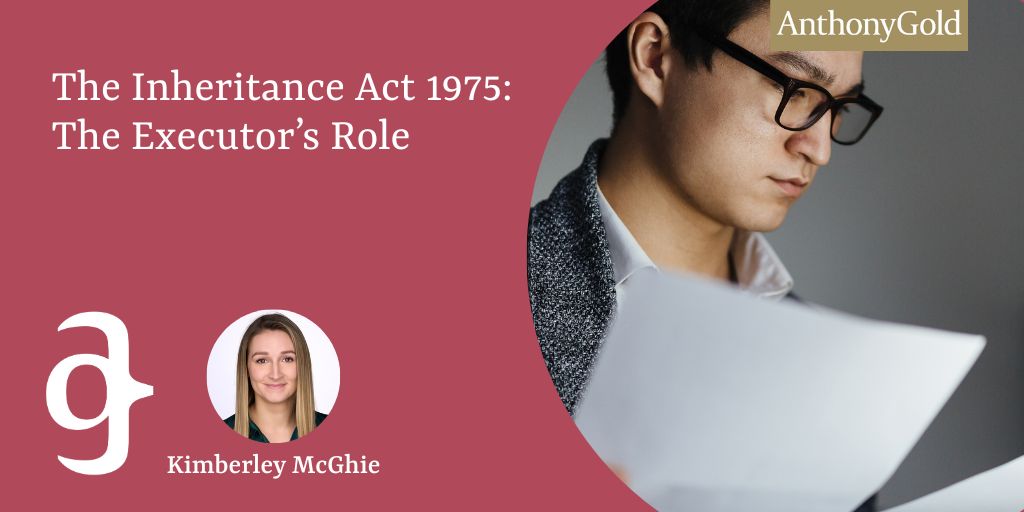The Inheritance Act 1975: the executor’s role


Those who have been excluded from a will, or not left as much inheritance as they expected, may be able to bring a claim against the deceased’s estate for reasonable financial provision under the Inheritance (Provision for Family and Dependants) Act 1975 (“the 1975 Act”). What is the role of the executor in these circumstances, and what happens if the executor is also a beneficiary of the estate?
An executor owes a duty to all beneficiaries of the estate. They are expected to adopt a neutral position in 1975 Act claims and to treat the other parties to the proceedings equally. It is the beneficiaries, who have an interest in the estate, who should actively defend the claim.
Whilst executors are expected to adopt a neutral stance, they should still be named as defendants in the claim. This is so that they are bound by the terms of the final order. The executor must then administer and distribute the estate in accordance with the deceased’s will or the intestacy rules, subject to any variations ordered by the court.
After the claim is issued and served, the executor is required to file and serve a witness statement setting out the details of the net estate, as set out in the Civil Procedure Rules (“CPR”) 57.16(5) and Practice Direction 57.
Generally, executors are only entitled to recover costs from the estate that have been properly incurred as part of the estate administration. This means that if the executor limits their witness evidence to providing the information required of them, and they remain impartial, they will generally be entitled to their costs as an estate expense.
Conversely, if the executor actively defends the claim, and adopts a prejudiced role in the litigation, they risk being ordered to pay a proportion or all of their costs personally. Therefore, as long as the executor remains neutral, they will be entitled to their costs out of the estate on an indemnity basis.
In practice, for lay-executors, this often proves harder than it sounds. The deceased will have chosen that executor as they were onside and likely to agree to the content of the will. They normally know all the parties personally and may have a negative view of the claimant. It is the estate’s advisor’s role to limit their exposure to the risk of adverse costs.
During the 1975 Act proceedings, it is the executor’s responsibility to preserve the assets in the estate and to provide the parties, or the court, with information regarding the estate. Whilst the proceedings are ongoing, the executor should not make any distribution to the beneficiaries of the estate.
If you are an executor, and a 1975 Act claim has been threatened against the deceased’s estate, you should seek legal advice. This should be recoverable from the estate. Our specialist Contentious Probate Team at Anthony Gold would be pleased to assist you. You can contact us by email at mail@anthonygold.co.uk or please call us on 020 7940 4060.
On 19 June 2024, Anthony Gold partner Tom Dickinson and Senior Associate Solicitor Kimberley McGhie will be hosting a seminar with Ten Old Square Chambers to talk through the process of a 1975 Act claim. To register, please click on the banner below:
Please note
The information on the Anthony Gold website is for general information only and reflects the position at the date of publication. It does not constitute legal advice and should not be treated as such. It is provided without any representations or warranties, expressed or implied.

Our Latest Commercial & Civil Dispute Resolution Insights
- October 3, 2025
Capacity and loan agreements
- September 26, 2025
Ex-Gratia payments by charities – when and how to apply to the charity commission
- September 9, 2025
Procedure for appointing Litigation Friends for individuals who lack capacity
- September 1, 2025
Costs exposure for litigation friends
- August 22, 2025
Approval Hearings and Settlements for Protected Parties in Litigation
- August 18, 2025
Who should be a Litigation Friend?
Related Guides
- March 11, 2025
Understanding Capacity to Litigate and the Civil Justice Council’s Proposals
- March 11, 2025
Blessing Orders: When should a trustee apply to the court to bless a decision?
- March 11, 2025
What is a Benjamin Order?
Latest Articles
View allGuide: October 29, 2025
Guide: October 27, 2025
Contact the Conveyancing team today
Contact us today
"*" indicates required fields
Contact the commercial
& civil Dispute team today
"*" indicates required fields
Contact the Conveyancing team today
Contact the Conveyancing team today
Contact the Wills, Trusts
& Estates team today
Contact the Court of
Protection team today
Contact the Employment Law team today
Contact the Clinical Negligence team today
Contact the Family & Relationships team today
Contact the Personal Injury Claims team today
Contact the leasehold & Freehold team today
Contact the Corporate & Commercial team today
Contact the housing & disputes team
"*" indicates required fields















